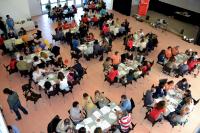
Eddy Adams, SIX Adviser and URBACT Programme Expert says Europe’s cities are widening civic participation to innovate, drive change and nourish democracy.
Decide Madrid (ES) is perhaps the world’s leading digital platform for engaging citizens in urban decision-making. With almost half a million registered members, it has re-wired the way Madrileños engage with local government. On 11th April 2019 URBACT will hold a capacity building event for cities looking to learn from Madrid’s experience.
This will be a hands-on session, aimed at equipping participants with the basic know-how to adapt this approach in their own context. URBACT has co-designed it with Decide Madrid, and the programme will support participation of stakeholders from URBACT cities. Further details and the registration link can be found here.
The stimulus for this event came from a series of City Lab activities that URBACT is conducting in relation to the Leipzig Charter. The charter introduced many of the key principles at the heart of today’s EU urban policy. The City Labs explore these and ways in which cities are interpreting and implementing them now. Participation is one of these principles, and the Decide Madrid approach was identified as a positive model in our first City Lab session.
This article refers to the principles established by the Leipzig Charter. It also explains the URBACT City Lab approach and focuses on the key learning points from the Participation session held in Lisbon in late 2018. Finally, it refers to leading city work in encouraging civic participation, and what needs to happen to encourage more cities to fully embrace the participation principle.
The URBACT City Labs

2007 seems like a long time ago now. This was just before the Global Financial Crisis hit the buffers, when social media seemed like a passing fad and the word BREXIT hadn’t even been coined. In that year, under the German EU Presidency, the Leipzig Charter proposed an ambitious set of principles relating to urban policy.
The Charter broke new ground. For the first time it underlined the need to have all levels of government at the table when urban issues were under debate. Most importantly, it stressed that cities had to be there – with an active voice – as equal players with national and EU level bodies. It also articulated a set of principles that have shaped urban policy in Europe – and beyond – since that point, most recently articulated through the subsequent Urban Agenda for the EU.
Fast forward to now and Germany is once more preparing to assume the EU Presidency in the second part of 2020. As it does so, work is under way to revisit and to refresh the Leipzig Charter.
The principles that came from the Charter – such as Participation, Integration and Sustainability – have long been at the centre of URBACT’s work. However, more than a decade after the charter’s appearance, these concepts are still not universally understood. In a European Commission survey of Baltic State cities last year, 8 out of 14 said that they were unclear about the concept of integrated sustainable urban development. Even when cities are clear on the concepts, they often struggle to implement them.
That is why URBACT is organising a series of City Labs related to the Leipzig Charter principles. Five of these will take place between 2018 and 2020, with the first four each focused on a key principle. The first, exploring the principle of Participation took place in Lisbon in September 2018. The fifth will bring together all of our key messages and will be held in Berlin in the spring of 2020.
In each City Lab our focus will be on how these principles are understood now. There will be space in each Lab to examine what is working well - how cities are embedding these principles in their approaches – as well as the opportunity to examine where they are getting stuck. A key question relates to the obstacles preventing more cities from adopting these principles – and what needs to be done about them.
Talking about Participation…

Talking about civic participation, what do we see as the main differences between 2019 and 2007? A number of trends seem evident. One is diminishing levels of trust in established institutions. Linked to this, we see declining levels of political participation, particularly at the local level. There are also rising incidences of civil unrest, combined with the growth of populism in many parts of Europe.
These are fast changing developments that many city authorities are struggling to respond to. However, Our City Lab activity clearly shows that many cities are adopting a proactive approach, characterized by a willingness to experiment and to redefine the working relationship with citizens. The driver for this is often a belief that our established governance tools no longer meet our needs – particularly in the digital age.
This was the starting point in the Portuguese city of Cascais, where local voting rates had fallen to below 40% by 2011. In response, it created a participatory budget model that is now widely acknowledged to be exemplary. Using a mix of digital and traditional engagement tools, Cascais has built this so that it now accounts for 18% of the total investment budget and has directly involved 115,00 citizens, more than half the population. This Cascais approach has been recognised with an URBACT Good Practice award.
In nearby Lisbon, another URBACT Good Practice is at the heart of a new Transfer network called Com.Unity.Lab. Devolving power and promoting citizen participation is also at the heart of this activity, specifically the city’s innovative Community Led Local Development (CLLD) model. The subject of an earlier URBACT article, this approach has focused on the city’s most deprived 67 neighbourhoods, enabling investment of over €9 million channelled through over 250 projects. Two interesting dimensions of the approach are its strong focus on neighbourhood capacity building and the requirement placed on grassroots organisations to collaborate.
Lisbon’s CCLD approach has benefited from strong political support. During the City Lab session, Deputy Paula Marquez spoke about the importance of neighbourhood approaches and that fact that “Cities must face global threats with local strategies.” Inspirational leadership has also been a catalytic factor behind the experiments in civic participation undertaken in Gdansk, Poland, another prominent City Lab contributor.
The death of Pawel Adamowicz in early 2019 is a huge loss to Europe’s urban policy community. At such times we seek small consolations, and one of these is the legacy of his commitment to involving citizens in Gdansk’s decision-making processes. We cannot speak about participation without talking about power. Here in Gdansk we saw a Mayor elected three times, pushing for this kind of change from the very top – mindful of the long shadow of mistrust between citizens and the state, after years of Communist rule.
The city authority’s experience in supporting civic participation has included place-making projects like the Coal Market, where citizens took charge of the reuse of a high profile public space. But it was Gdansk’s response to the 2016 floods that moved it towards more systemic deliberative processes, such as the design and implementation of Citizens Assemblies. Through this, they have learned to focus these processes on specific problems, with key lessons along the way. One of these, described during the City Lab sessions was that “the narrower the topic, the better the recommendations”.

And so to Madrid, that in the spring of 2019 is organising its own version of the Citizen Assembly – labelled a Citizens Observatory – widening its repertoire of participatory tools. Following the lead of cities like Adelaide and Toronto, Madrid is utilizing a sortation model to create a representative panel of 49 citizens to act as a sounding board on city policies. The City Authority has been at pains to ensure that its composition reflects that of the city population, for example by making sure that there are more women than men on board.
Madrid’s plans to establish a Citizens’ Observatory are on the back of the success of Decide Madrid. This evolved from the new administration’s commitment to widening the civic participation process. From a single initiative focused on the redesign of a city square, it has grown into a major crowdsourcing platform. More than 20 000 proposals have been submitted by citizens via the portal, which commits the city to implementing those receiving enough backing from citizens. Voting is a mix of postal and digital platform, with over 200 projects funded to date through a budget of EUR 100 million.
Participation – the next steps
Our cities face increasingly complex wicked problems. At a time when we also see growing levels of polarization amongst citizens, new tools are needed to find solutions and to repurpose our democracies.
The city level provides an ideal platform to try and test these new solutions. However, many cities still lack the knowledge and capacity to follow the lead of the ones we showcase here. Supporting them to do this will be important, if the European Commission’s commitment to bring Europe closer to its citizens is to succeed.
URBACT has a role to play in this. The programme’s mandate to involve all relevant stakeholders in this urban development process reflects its connection to the Leipzig Charter principle of participation. The Madrid event in April forms part of that work, and it will be followed by other interventions in the coming months. We hope to see you there.

